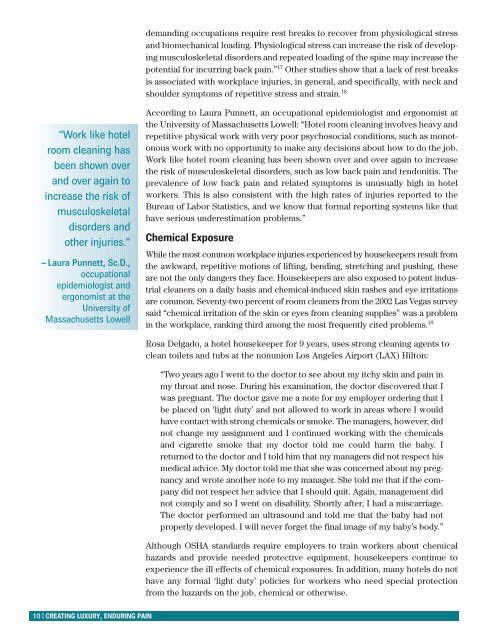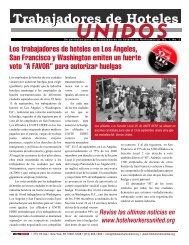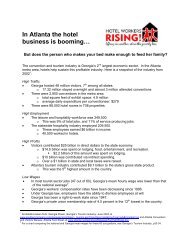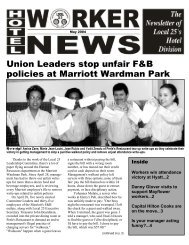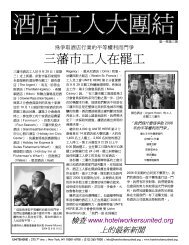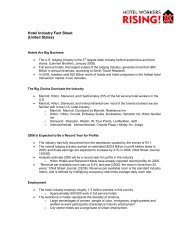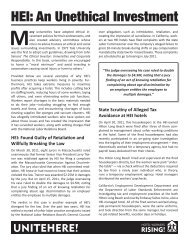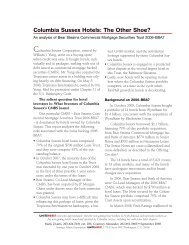Report (2006) Creating Luxury, Enduring Pain - Hotel Workers Rising
Report (2006) Creating Luxury, Enduring Pain - Hotel Workers Rising
Report (2006) Creating Luxury, Enduring Pain - Hotel Workers Rising
Create successful ePaper yourself
Turn your PDF publications into a flip-book with our unique Google optimized e-Paper software.
demanding occupations require rest breaks to recover from physiological stressand biomechanical loading. Physiological stress can increase the risk of developingmusculoskeletal disorders and repeated loading of the spine may increase thepotential for incurring back pain.” 17 Other studies show that a lack of rest breaksis associated with workplace injuries, in general, and specifically, with neck andshoulder symptoms of repetitive stress and strain. 18“Work like hotelroom cleaning hasbeen shown overand over again toincrease the risk ofmusculoskeletaldisorders andother injuries.”– Laura Punnett, Sc.D.,occupationalepidemiologist andergonomist at theUniversity ofMassachusetts LowellAccording to Laura Punnett, an occupational epidemiologist and ergonomist atthe University of Massachusetts Lowell: “<strong>Hotel</strong> room cleaning involves heavy andrepetitive physical work with very poor psychosocial conditions, such as monotonouswork with no opportunity to make any decisions about how to do the job.Work like hotel room cleaning has been shown over and over again to increasethe risk of musculoskeletal disorders, such as low back pain and tendonitis. Theprevalence of low back pain and related symptoms is unusually high in hotelworkers. This is also consistent with the high rates of injuries reported to theBureau of Labor Statistics, and we know that formal reporting systems like thathave serious underestimation problems.”Chemical ExposureWhile the most common workplace injuries experienced by housekeepers result fromthe awkward, repetitive motions of lifting, bending, stretching and pushing, theseare not the only dangers they face. Housekeepers are also exposed to potent industrialcleaners on a daily basis and chemical-induced skin rashes and eye irritationsare common. Seventy-two percent of room cleaners from the 2002 Las Vegas surveysaid “chemical irritation of the skin or eyes from cleaning supplies” was a problemin the workplace, ranking third among the most frequently cited problems. 19Rosa Delgado, a hotel housekeeper for 9 years, uses strong cleaning agents toclean toilets and tubs at the nonunion Los Angeles Airport (LAX) Hilton:“Two years ago I went to the doctor to see about my itchy skin and pain inmy throat and nose. During his examination, the doctor discovered that Iwas pregnant. The doctor gave me a note for my employer ordering that Ibe placed on ‘light duty’ and not allowed to work in areas where I wouldhave contact with strong chemicals or smoke. The managers, however, didnot change my assignment and I continued working with the chemicalsand cigarette smoke that my doctor told me could harm the baby. Ireturned to the doctor and I told him that my managers did not respect hismedical advice. My doctor told me that she was concerned about my pregnancyand wrote another note to my manager. She told me that if the companydid not respect her advice that I should quit. Again, management didnot comply and so I went on disability. Shortly after, I had a miscarriage.The doctor performed an ultrasound and told me that the baby had notproperly developed. I will never forget the final image of my baby’s body.”Although OSHA standards require employers to train workers about chemicalhazards and provide needed protective equipment, housekeepers continue toexperience the ill effects of chemical exposures. In addition, many hotels do nothave any formal ‘light duty’ policies for workers who need special protectionfrom the hazards on the job, chemical or otherwise.10 | CREATING LUXURY, ENDURING PAIN


